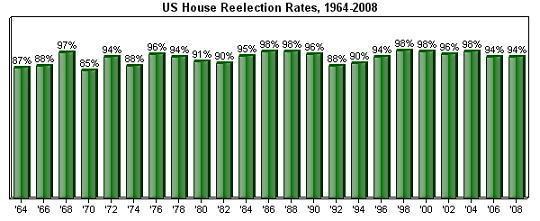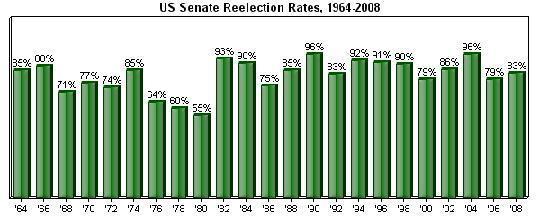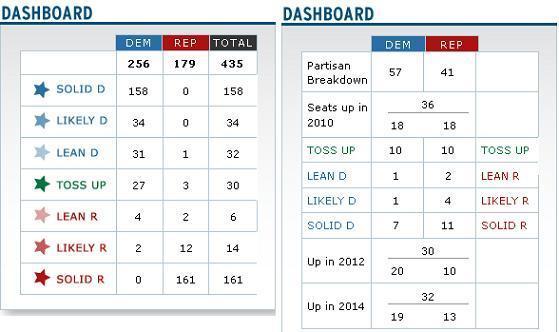One of the things you'll hear the political media blathering on and on and on about for the next few months is that the 2010 election season is shaping up to be a bad year for incumbents. But what does an "anti-incumbent" year look like? I've been trying to get my head around it. If you're me and you want to know how many anti-incumbent years that, say the House of Representatives, has had since I emerged from my mother's womb, the answer is zero:

[SOURCE: Open Secrets]
In the Senate, the story is different. Senators do not seem to have a statistical lock on incumbency, and there are actually some bad years in the mix -- most notably in the '80s "Reagan Revolution," when the re-election rate dropped to 55%. Nevertheless, those rates quickly returned to very high levels in the years that followed.

[SOURCE: Open Secrets]
So how is this year shaping up? The Cook Political report has a snapshot of the field right now, in both the House and the Senate. At a glance, the "anti-incumbency" meme does have a little grounding in reality.

In the House, if you exclude all the incumbent "solids" and "likelys," you end up with the potential loss of 70 incumbent seats. If all 70 flip, your House re-election rate drops to about 84%. That's a bad year for incumbents relative to historical trends, but if that's the end result of unprecedented nationwide voter outrage against incumbents, then this outrage is getting badly oversold. If the worst that can happen is that an angry electorate will send 84% of their elected officials back to the House, then incumbency remains a pretty good racket.
Over in the Senate, though, it's a different story, with 13 of 36 races looking like they're "in play." Come election night, it's the Senate that looks poised to feel the full brunt of whatever anti-incumbent fervor is out there.
[NOTE/ADDENDUM: An alert reader points out that the Senate dashboard doesn't add up. Going back to the main Senate page at Cook Report, there are ten Senate races, in total, that are considered toss-up, not 20 as the dashboard seems to suggest. They are: Arkansas (Blanche Lincoln (D)), Colorado (Michael Bennet (D)), Connecticut (Chris Dodd (D)), Florida (George LeMieux (R)), Kentucky (Jim Bunning (R)), Missouri (Kit Bond (R)), Nevada (Harry Reid (D)), New Hampshire (Judd Gregg (R)), Ohio (George Voinovich (R)), and Pennsylvania (Arlen Specter (D)). So, each party is risking five seats in toss-up races. The original "23 of 36" figure above has been struck-through and revised.]
Of course, all that means is that come next year, the Senate will return with more or less the same cast of characters, in toto, as currently ply their trade today. And on reflection, it's a pity that a deliberative body has to become nearly entirely broken before voters decide to change things.
I've always had a little bit of personal bias against incumbency, because I don't think job security should be easy for politicians to obtain and because the forces that prop up incumbents -- bland party mechanics and big dollar donors -- tend to be pernicious. Naturally, people disagree! The case for incumbency, of course, is that legislators get to amass a wealth of experience. Of course, that's also how you end up having a critical debate on the future of banking that includes the significant involvement of a guy who's never used an ATM.
[Would you like to follow me on Twitter? Because why not? Also, please send tips to tv@huffingtonpost.com -- learn more about our media monitoring project here.]
